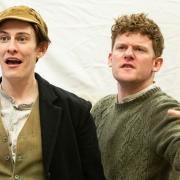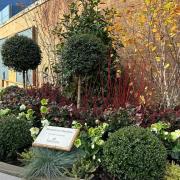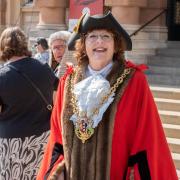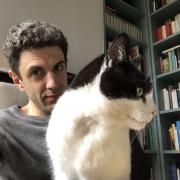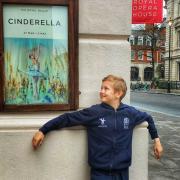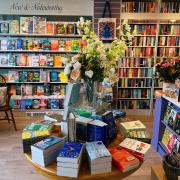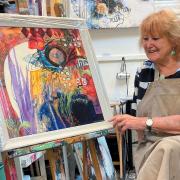It’s a question ‘Suffolkers’ rarely stop to ask themselves. But just how do our unique characteristics shape our lives and how they will determine our future
There’s an old joke in Suffolk, that you can’t say you’re from around these parts until you’ve inhabited them for at least 40 years. Except for natives, of course, and they’re easy to spot. . . right? What is it, exactly, that distinguishes a Suffolk person?
Troubled times put our national character to the test and have a way of showing us for who we really are, and events of 2020 got me thinking about our quiet corner of the country. What part does our local and regional character play in the way we live our lives, celebrate achievement and deal with adversity? Do we behave differently because of where we’re from? Does the north-south divide really exist (I’m talking Norfolk-Suffolk here)? What does it mean to be a Suffolk person and how does that shape our lives?

Are you different if you’re born here to someone who’s lived here for a mere decade or so? And what impact does ‘incomers’ have on our county character?
Many people, choose to make Suffolk their home because, despite its proximity to London, it’s peaceful and private (although never describe it as a backwater). This includes celebrities who have ‘discovered’ a country idyll where unimpressed locals don’t bother famous people. We’ve always been comfortable about not being ‘on the map’, especially when discovery extends to comedians making our county town the butt of their jokes (fortunately, we have a robust sense of humour).

It probably speaks volumes about us that Suffolk doesn’t have a well-defined profile – or a motorway. Travel the world, or just other parts of Britain, and tell people where you’re from and they’ll most likely respond with ‘Where’s that?’ And what should we call ourselves? People from Yorkshire, Lancashire, Kent and Cornwall proudly identify themselves as men and women of the county, while we tend to state shyly ‘I’m from Suffolk’. It’s a rum owd dew.
So, Suffolk man David Green, who’s spent a lifetime writing about the county and its people, gives his view and looks to some natives and newbies for an answer to the question ‘What makes a Suffolk person?’
Jayne Lindill, editor Suffolk Magazine

Pride and privacy
by DAVID GREEN
Taciturn, private, loyal, shy, cautious, unhurried, thorough, fatalistic, superstitious, proud and more likely to under-state an ability.

These are, for me, some of the characteristics of ‘born and bred’ Suffolk people. And, while it might take decades, those that come in from the outside eventually find they fit the same mould.
Suffolk people take time to accept ‘strangers’ and newcomers, but when they do warm to them they can be very generous and loyal. Banter between friends is much enjoyed and humour tends to be very dry and gentle. But grudges can be held over a lifetime.
Suffolkers tend to be people of few words and who notice more than they admit to. In a rural landscape disturbed only by the occasional tractor, a lone walker a mile away is noted and remembered.
What has been lost in the villages and the towns over the past decades, and which has had an impact on the Suffolk character, is inter-dependency and, consequently, a sense of local community and togetherness. In the country areas, particularly up until the Second World War, farming tended to involve and unite the whole community. Yes, there were disputes and bad feeling sometimes, but harvest, particularly, brought everyone together for it was the lifeblood of the local economy, from the men who cut the corn and the women who sheafed it, to the blacksmith, farrier, publican, shopkeeper and mole-catcher, and the children who picked stones and scared birds in the fields.
No one in their right mind regrets the passing of the back-breaking, monotonous, forelock-touching world of pre-industrialised agriculture. But for all its benefits, mechanisation has led to loss of jobs and community spirit. While efforts to revive this spirit in some villages have paid dividends it has usually only been successful with leadership from either a latter-day ‘squire’ figure or a handful of middle-class newcomers.
In the towns, local neighbourhoods have disintegrated as houses are repeatedly bought and sold and whole areas ‘redeveloped’. Privacy is now closely guarded. How many townspeople hardly know their neighbours and have any contact with them?
For all the knocks Ipswich has taken its people still have pride in their town, and although its football team is now in the doldrums its history of success in winning titles at home and abroad remains a source of great pride and, sometimes, great jealousy from those over the border in Norfolk. It remains highly satisfying to point out to Norwich City supporters that despite their club currently being in the ascendancy, it has won nothing over the years but plaudits!
Meet the Felixstowe College girl who became Britain’s first female football reporter
The 'Newcomers'
Louise Camplin, who lives in Halesworth with her second husband, Bill, was born in Surrey and trained as a teacher at Homerton College, Cambridge. A Suffolk resident since 1972, she has taught drama, in and out of schools, for the past 50 years. A farmer’s wife for 22 years she was director of the Laxfield Children’s Drama Club from 1979 till 2009. She has five children who were all brought up in Suffolk and two of them still live here.
“Suffolk people don’t say much and don’t miss much. They observe, listen, know – but although they can sometimes talk the hind legs off a donkey, they don’t give anything away.
“Unlike their neighbours in Essex and Cambridgeshire they are uninterested and unimpressed by flamboyant showiness and status symbols.
“They are thrifty, careful and canny with money and don’t miss a business opportunity. Talking about a farmer who lived near us at Ubbeston, one of our neighbours said: ‘He can’t read, but by God he can count’.
“While Suffolk people can lack imagination, they are grounded, understated, unswerving, stoical, loyal, principled, hardworking, tenacious (sometimes to a fault) and not given to flights of fancy.”
Karen Goddard was born in London and moved to Felixstowe with her family when she was five, attending the local primary and secondary schools. She studied art history at Leicester Polytechnic. After working at the Wolsey Theatre in Ipswich as marketing assistant she moved to Sussex, Cheshire and the Netherlands, before returning to Suffolk, to Brandeston. She worked as a freelance journalist and copywriter before spending ten years as development manager with Ipswich-based Eastern Angles Theatre Company. Two years ago she became a freelance theatre producer, supported by Arts Council England to work with a range of local artists and companies. She now lives in Charsfield and has three grown-up children. They all fled the county and now live in South London.
“Suffolk people are essentially self-deprecating. We’re not inclined to celebrate success, we don’t pin our colours to the mast and we follow rather than lead.
“We don’t wear our hearts on our sleeves. We are afraid of rejection, nervous about throwing a party or making a spontaneous phone call in case the invitee doesn’t want to party/chat. The Suffolk humour is gentle and often deadpan and throwaway. A joke is mumbled under the breath without fanfare. An aside. That’s also about fear of rejection.
“We don’t hold court and regale people with long anecdotes. We do the unassuming one liners. If they go unnoticed that’s fine. No one gets embarrassed. No sense of falling flat. If they are picked up – great. Wry smiles all round!”
Dymphna Crowe, who was born and brought up in Ireland, moved to Suffolk from London 40 years ago, spending five years at Debenham before moving to her present home at Westerfield. A keen historian she has researched the unrest in rural Suffolk during the 18th and 19th centuries and compared it with similar eras in rural Ireland. Unrest in Ireland led to revolution – but not in Suffolk.
Dymphna has also undertaken oral history projects with the Ipswich Co-op History Group, interviewing people in Framlingham and Ipswich.
“I had imagined that moving to Suffolk would be a little like returning home, since I grew up on a farm in rural Ireland. But it took me a while to settle in. My first year was quite lonely. It was an abrupt change from the bustle of London, particularly as I also went from full time work to full time motherhood. I found local people to be friendly and courteous but very private and wary of outsiders. But, with small children, there was a gradual sense of acceptance, as my children joined pre-school and school. But still many of my acquaintances were outsiders like myself.
“It was in 1986, when I went to work at the Ipswich Hospital, that I really got to know local, Suffolk people, learning the local words and idioms, including words like ‘shew’ [showed], and became accustomed to stories being related in the present tense. I also discovered warmth, humour and kindness.
“One of my local history projects was work for an exhibition depicting women’s experience in the workplace in the early twentieth century. Women recalled the work and the camaraderie and their sense of belonging.
“In the 40 years since I came to Suffolk it has become home. There are many similarities with County Cork where I grew up – the same sense of pride and belonging, of practicality. There are differences also. There is still a deference to authority among Suffolk people, especially among rural people, that is less noticeable in Ireland. Irish people are more immediately gregarious and friendly. Suffolk people take time to get to know but, once one is accepted, there is great warmth.”
Alan Huckle moved to Suffolk from the industrial north of England 38 years ago when he was appointed deputy head of Witnesham Primary School and says he and his wife, Joan, fell in love with the county and its inhabitants. The couple first lived at Debenham and then moved to Occold, then Eye. Home is now at Cotton, near Stowmarket.
Alan retired from teaching in 2000 when he was head of Bressingham Primary School and since then has had more time to indulge his love of the theatre, acting in various amateur productions and also writing and overseeing the performance, on stage and on film, of many of the plays he has written.
“We find Suffolk people friendly and endearing. They made us feel welcome right from the start.
“There seems to be a difference between the generations and sadly some of their defining attributes are, perhaps, disappearing. Those who have lived in Suffolk all their lives have little interest in or knowledge of the outside world and we celebrate this idyllic trait.
“Many of them work or have worked on the land and seem to be less aware that life elsewhere has moved on. They have, in the nicest sense, a slow and simple, ‘laissez faire’ attitude to life with a strong sense of family, friends and village.
“But I think it is true to say that there is an echo of feudalism. Many of the older generation seem to be subservient to hierarchy. The younger generation – for the most part anyway – are more outward-looking.
“There is a suspicion of outsiders who move in and take over and spoil their villages, especially those from the London area – and especially those with holiday homes – and including those who drive large cars and spend vast amounts enlarging their houses but never seem to put anything back into the community.
“For some reason, there is a historical rivalry with Norfolk which we find puzzling, and yet no one seems to know why this exists. And there is also a hatred of Londoners, who some call ‘interfering know alls’ I’m not sure why. Thankfully they seem to have a soft spot for northerners, as we have for them.
When you get to know them, ‘Suffolkers’ are very sociable and love to chat – visits to the village shop can take forever. But some speak an undecipherable language which defines their personality – slow and steady, sprinkled with good humour.”
The Border-Hopper
Rachel Kellett was born in Norfolk, educated in Essex and after living and working in London for 15 years moved in 1999 to Metfield, Suffolk, where she was instrumental in saving the village shop from closure.
She spent ten years in India, teaching in a Buddhist school, setting up a non-governmental organisation called Toxics Link and supporting her partner who founded a branch of Greenpeace in that country. They co-wrote Life in Plastic, about the impact of plastics in India.
Rachel now lives in Holton where she owns a woodland and where, among other community-spirited initiatives, she helps to run a forest school.
“When I think of the Suffolk character I think of Mr Palmer our local butcher or Huggy, a car and cycle mechanic, here in his shop for 24 years. They are dependable as rain, not in a hurry, constant and caring.
“I have, among Suffolk people, noticed a reserve towards strangers until they have won their trust.
“A friend gave me this story. Arriving first as a holiday home owner up here, he was looking for a gardener to mow his lawn occasionally. One was found. “I’m very busy,” was the first thing the Suffolk man said. However, he agreed to cut the lawn. “But only the lawn, mind. I won’t do anything else.” He ended up doing everything for my friend, finding craftsmen for any other job they needed doing. He became their friend.
“There was a swathe of people who arrived in Suffolk from London and its environs in the `70s, finding inexpensive homes in abandoned Suffolk long houses, forming ‘alternative’ festivals such as Barsham and Bungay Fairs, tapping into the traditional rural or nomadic seasonal gatherings, and a back-to-the-land early green ethos. When I came here in 2000, I found both nurture and kinship with this group, who had rooted here, sent their children to the local schools, planted trees, painted, potted. They loved the Suffolk land and sky as a visitor does.
“I am content here and will most probably land up buried here!”
The ‘Suffolkers’
Gilly Shiner, a retired educational psychologist, was born and brought up in Lowestoft. She lived in Norfolk for some years before moving to Beccles and, currently, Bungay. She worked as a volunteer in Namibia between 2006 and 2012, helping children with special needs who did not have access to education, and training teachers and other professionals.
“Is there a unique characteristic of the people from Suffolk? I don’t think so. And anyway who are the Suffolk people? People born in the county? People raised there? People who find themselves living in Suffolk?
“Suffolk has many sides. It encompasses relatively remote countryside, coastal areas, farming communities, towns, deprived districts, stately homes, holiday villages.
“Then there is Ipswich – not designated as a city but probably should have been – Bury St Edmunds, rich in history, Lavenham, a quaint Tudor [sic] village, Lowestoft, once prosperous but no longer. Is it likely that all of these places would spawn a distinctive Suffolk character?
“I was brought up in Lowestoft and can remember biting winds, the smell of fish and the all too frequent singing of “Eternal Father strong to save” at school assemblies following the loss of a fishing boat from the town. Maybe the climate and closeness of death contributed to a certain stoicism and reluctance to embrace life with laughter and jollity. But it did not apply to everyone, and I doubt the same could be said for the Suffolk people in general.
“I wonder, did the world of trawlers, drifters and herring impinge on the lives of children growing up in Bungay where I live now? Did we have common Suffolk characteristics?
“As an adult living on the Norfolk-Suffolk border, I raised my own family in a small village where many people had lived all their lives. The village community had it’s own features, probably distinctive of small villages across the country and I suspect much the same as those of many Suffolk villages. At that time there were many people who rarely left the village, had never been to London or any city except maybe Norwich, and showed little or no interest in widening their horizons through travel. On the surface they seemed satisfied with their lot and expected no more.
“Most people spoke with a local accent and used dialect which was familiar to me from my childhood. The dialect and manner of speech could be defined as characteristic of Suffolk – or in this case the Suffolk-Norfolk border. However, the apparent acceptance of life being ‘the way it is’, and the seemingly low expectation of change is, I think, not characteristic of Suffolk per se but rather indicative of the circumstances of upbringing and education, and the relative wealth or poverty of those factors.
“But things have changed. Are we trying to conjure the ‘Suffolk character’ as a nostalgic thing of the past? Was there a distinctive Suffolk character, now disappearing?
“Evidently society has changed greatly since I was born in the 1940s. In my case the wider family and neighbours mainly delineated the social circle of my parents. I expect the same was true for working class people across the country. I suspect there are characteristics of the age and of class, but are they specific to Suffolk?
“I feel very uncomfortable about defining a Suffolk character. There is, I feel, a danger in any stereotyping. It can be amusing to reflect on characters and to ascribe characteristics as common to a place, but judgment based on where you live, or were brought up, does not reveal a real understanding of people or their lives.”
Ivan Cutting was born in Shotley and comes from a family which has lived in Suffolk for more than 200 years. He broke the succession 25 years ago when he had the temerity to cross the Waveney and live in Harleston, Norfolk, at least a mile from the Suffolk border. But for the past 38 years he has been artistic director of Eastern Angles, the region’s foremost touring theatre company, which is based at the Sir John Mills Theatre in Ipswich. He has written and directed many plays about Suffolk and about East Anglia in general.
“No matter where you come from, living under these skies, passing fields that change colour every season or surveying the placid waters of our broads and estuaries – have you ever seen a Suffolk river in full spate – is different.
“We may still not leave home without an umbrella or raincoat, but we know it’s likely to be redundant. This must affect our outlook, if only in a crafty way. We know we are lucky to live here and so propitiate the Gods by not being too bloody cheerful about it. After all, the films tell us that the waitress that bids us ‘have a nice day’ is going to get it before the last reel. And sanguinity is so much more cool than gushing smiles.
“Kevin Crossley-Holland, poet, author and translater, used to remark on the possibility of Anglo-Saxon characteristics prevailing through the years as a ‘dogged, stubborn strain in our make-up’.
“It was certainly reflected in the temper of our audiences on tour. It was more than common for a show to produce riotous laughter down in Essex, a quiet chortle in Suffolk and barely a smile in Norfolk. But still I remember in Breckland a gentleman who had sat in the front row in stony silence, coming up to me afterwards to say that he “han’t enjoyed anything so much in a long toime.”
The Suffolk character is a complex beast and whereas Kevin may ascribe this partly to our northern heritage – and oh how we all love those Scandi-noirs and despise the ‘Have a nice day’ farewells of across the Atlantic – can it really be down to our 1,400 years of Scandinavian genetics? Haven’t we all moved round a bit since then?”
Dim prospects?
David Green recalls the controversial views of a West Country couple who made their home at Wickhambrook
Suffolk people are not proud of their county, are illogical and lack independence and guts.
These opinions were put forward in 1963 in a book called Suffolk Prospect written by Justin and Edith Brooke, who had arrived in the county in 1928 from the West Country to farm at Clopton Hall, Wickhambrook. They gradually bought more land, ending up with nearly 2,000 acres.
They also thought Suffolk farmers had improved the landscape by grubbing out miles of hedgerow and lamented the lack of folk songs in a county which, in fact, has a fine heritage of songs and singers.
The couple also had lots of good things to say about Suffolk people – their kindness and generosity, their “gentle tolerance and goodwill” and their “distinctive and amusing sense of humour”.
But it was the more negative comments which, at the time of publication, might have made many ‘born and bred’ Suffolk people foam at the mouth. And perhaps more so today.
Mr and Mrs Brooke wrote that they had arrived in Suffolk to find “the cruel poverty of the district”. Unemployment was high and country folk were wearing clothes that were “little better than rags”. Farm wages at that time were 30 shillings a week (£1.50 in today’s currency).
The couple developed what became West Suffolk’s biggest fruit farming enterprise, providing many jobs for locals.
Mr Brooke, who appears to have written most of the text, died just before the book was published. He told his readers that every county in England except Suffolk thought it was the best county of all. “I have never heard a Suffolk man express pride in his county; how different from Norfolk which is very county conscious,” he wrote.
“The Suffolker seems to feel as if he came from a somewhat inferior race; certainly his character, unlike that of the Norfolk man, is sadly lacking in independence and guts.”
Mr Brooke said he thought country people in Suffolk were different from the dwellers of other parts of rural Britain. “They are tall and generally fair with blue eyes,” he claimed.
He welcomed the clearing of field hedges, saying that this improved the landscape by revealing the little hills and valleys.
The virtues of Bury St Edmunds were extolled but Mr Brooke had a dim view of Ipswich which he described as “a lower middle class town of little architectural merit”.
He also wrote: “I would say of Suffolk people that they are without imagination; they live entirely in the present, forgetting the past and are not looking to the future; this makes them good soldiers but poor poets. One must not expect loyalty because the past is always forgotten.”
He and his wife suggested that in the spoken word Suffolk people were masters of the irrelevant. “Nothing is clear cut, nothing is logical,” they claimed.
Mr Brooke hoped in coming to Suffolk he would collect many folk songs. However, he says he was able to find only one – this in a county with a rich tradition of folk music and song.
“The relationship between the sexes in Suffolk is uninhibited,” the authors also claimed. The girls do all the courting, they suggested.
On cooking, the couple say the worst traditions attributed to English cooking are “most faithfully observed in West Suffolk.”
After Justin’s death the farm was run by Edith until she retired in 1977 when it passed to daughter, Elizabeth, and then grandson, Chris.
Town & country
TERRY HUNT, former East Anglian Daily Times editor and country boy
I’ve been set some challenges during my 40 years as a journalist, but Suffolk Magazine editor Jayne Lindill definitely raised the bar. “I’d like you to write about what makes a Suffolk person,” she said.
Now, there are about 750,000 people living in our wonderful county, so how on earth can you possibly sum them all up in a short article? Everyone from people who have lived here all their lives (like me) to those who have arrived more recently, after discovering the delights of Suffolk.
But, always up for a challenge, I thought about it. . . and, yes, I realised it is possible to describe the characteristics of a Suffolk person.
Let’s start with one which is widely recognised. Suffolk people are modest, understated, and often disarmingly self-effacing. “I hope you don’t get biggity,” said my lovely grandmother whenever I was promoted at work. That was Suffolk for big-headed. I don’t think I did.
Of course, being modest and unassuming are charming qualities in a person. Suffolk people recoil from the brash, the pushy, the conceited – you know, the ones who talk a good game with no substance behind the empty words. I would never want that to change. It is one of the reasons I love being in Suffolk so much. But – and we have to be honest here – it can hold the county back.
That charming modesty, and reluctance to shout the odds, can see Suffolk lagging behind. We are still a bit of an unknown quantity.
So often, I will talk to knowledgeable people from elsewhere in the UK, and they will only have the vaguest notion of Suffolk. ‘Is it near Norfolk?’ is an all too regular response. Rather like mistaking a Canadian for an American, or a New Zealander for an Aussie.
Does that matter? Well, I know there are those who would prefer Suffolk to be undiscovered, but we owe it to future generations to welcome folk to our beautiful county. With them comes money, jobs, and opportunity.
The understated nature of Suffolk people can sometimes be misinterpreted. We tend not to be the kind of folk who are ‘all over’ people on first meeting them. We take a little time to get to know them first.
If you move into a Suffolk village, you might wrongly think people aren’t especially friendly, because they haven’t rolled out the figurative red carpet for you. But just give it a little time. The first meeting will be a polite conversation, and as the weeks and months pass, the friendship will build. And, believe me, once you have the trust and friendship of a Suffolk person, it will be rock solid. They will be ever reliable, never pushy, never in your face, but always there when you need them. The very best of loyal friends.
Another well-known, but sometimes misunderstood Suffolk characteristic is our sense of humour, as dry as the Sahara. Some of the tales are legendary, such as the well-spoken gent stopping his big shiny car to ask the Suffolk local: ‘I say, my man, how long will it take me to get to Halesworth from here?’ The local thinks for a bit, and then replies: ‘That’ll all depend on how fast yew’ll be a-gorn.’
Where did our slightly introspective character come from? I suppose it’s a legacy of centuries in which people’s worlds consisted only of their village, the few surrounding communities, and very occasional trips to the town.
When I was growing up, there were many older people in my village – all of 11 miles from Ipswich – who had never been to the town. Framlingham was big enough and busy enough for them. Of course, that’s all changed now. The world is a small place. Travel is second nature. People have much wider horizons.
But the wonderful characteristics of Suffolk people remain to a large extent. And long may that be the case. Those attributes of modesty, loyalty, reliability, and a wonderful, quirky sense of humour are so precious.
I’m so pleased to be here, and I’m delighted my children have grown up here to hopefully soak up something of what it means to be a Suffolk person. There are none better.
LYNNE MORTIMER, journalist and townie
What makes a Suffolk person?
I’ll ‘fess up straight away. I’m from Ipswich and some would say there is a distinct difference between city-types like me and rural dwellers.
It’s true that I get a nose bleed if I am more than 20 miles from a Marks and Spencer and that any suggestion of swimming in the staggeringly cold North Sea is, for me, tantamount to Goldfinger’s: “No, Mr Bond, I expect you to die,” but my home town and county have fashioned me and never fail to surprise and delight me.
Did you know, for example, that the ratepayers of Ipswich voted to pay more to the council so the town could establish its own museum?
The town’s most famous son, Cardinal Thomas Wolsey was Henry VIII’s chancellor and a man much vilified by history, not least because he was a Suffolk person and his father was ‘trade’. While he has – thanks in part to Hilary Mantel’s Wolf Hall – been rehabilitated, it is worth noting that unlike many of his powerful contemporaries he did not habitually have people tortured and killed.
Suffolk benefactors have given mighty parklands to the people of Ipswich. If we had not been bequeathed Chantry Park, where we have put Ed Sheeran’s concerts? If Christchurch Mansion had not been gifted to us, where would we get put an Ed Sheeran exhibition?
There was a glorious time when Ipswich Town were one of the most famous and feted football teams in Europe. When I travelled abroad and people asked where I came from, I could say “Ipswich” in the certain knowledge they would have heard of it. Thank you, Sir Bobby Robson (albeit you come from up north), for those wonder years.
In the 60s, you could stand on the Cornhill, point yourself in any direction and be in countryside within minutes. My neighbour, Debbie, and I would often cycle to Nacton Shore or Tuddenham (where my best shoes got sucked off my feet by the mud).
A bus ride to Freston revealed a vast chestnut wood, and blackberries studded the brambled byways.
Nana Jeffries, an enthusiastic fruit picker, would bring home apples that would be over-wintered in chest drawers. My self-appointed mentor she warned me against the very un-Suffolk practice of “putting on airs and graces” and “answering back”.
The seaside was a constant joy. We would pack bridge rolls spread with Shippams beef paste, hard boiled eggs and tomatoes. Dad would put a matchstick in the hole in the salt cellar so it would survive the journey. You can’t eat a hard-boiled egg without salt. We walked to Derby Road station and took the train to Felixstowe Beach station.
They’ve built on some of the countryside, closed some of the pubs and churches and given us those new-fangled dual carriageways - not enough of them, mind you. But the art of being a Suffolk person is largely unaffected.
It is, however, hard to be subjective when you are one but if I had to sum it up, it is the sound of the sea, the smell of autumn woodlands, the markets, the frank appraisals of everything you do by other Suffolk people and, most of all, that wicked sense of humour.
I missed it so much when was at college in Liverpool in the 70s. Who knew that Merseysiders don’t call pushchairs “trippers” and that a latecomer apologising for being “on the drag” would elicit a raised eyebrow from the locals? And “Do you want to come round mine?” was also greeted with suspicion. It was always a relief to be back in Suffolk and, dear reader, I am still here.
Find out more about Suffolk
Museum of East Anglian Life eastanglianlife.org.uk
Suffolk Museums Association suffolkmuseums.org
Suffolk Archives/The Hold suffolkarchives.co.uk/the_hold
National Trust nationaltrust.org.uk (search Suffolk)
English Heritage english-heritage.org.uk (search Suffolk)
East Anglian Film Archive eafa.org.uk
Read: George Ewart Evans' Ask the Fellows Who Cut the Hay and The Pattern Under the Plough
Adrian Bell Corduroy
How to speak Suffolk
The Suffolk accent is notoriously difficult to master, and we shake our heads when actors called upon to play a person from round here resort to a West Country burr. But like many English dialects, Suffolk’s unique language is rapidly disappearing thanks to geographical and social mobility. But some expressions remain in use, even though we may not realise where they come from, and there’s a move in some quarters to do more to protect the Suffolk dialect. Here are some phrases to get you started with help from rumowddew.com, where you can find more Suffolk wit and wisdom.
Thas a rum owd dew or thas a rum’un – a peculiar situation
Sloightly on th’ huh – skewed or wonky
Dew yew keep a troshin bor – ‘troshin‘ means threshing, a major part of harvesting.To ‘keep a throsh’n’ is to say, ‘keep on doing a good job’
‘At’s a proper. . . ’ or ‘thas roight proper’ – exact or as it’s supposed to be
Thas suffen good or ‘rarely noice’ or ‘hully good’ – very good
Howd yew haard – ‘wait a minute’, urging caution
Best I git gorn – ‘I think I should leave’
How yew a’ diddl’n? – ‘how are you’ or ‘are you well?’
Cood a hell, or ‘caw’d a hell’, ‘cood a blaarst’ – exclamation of ‘Well I never!’
Moin’d how yew goo – have a safe journey
Ah yew al’roight, bor? – friendly greeting. ‘Bor’ means ‘boy’
Play’n silly buggers – messing about, getting up to mischief
Load a’ squit – nonsense or rubbish eg ‘talk’in a’ load a’ squit‘
Taint be ser loikely, bor – not very likely
Mardle – to chat or tell a story, using ‘wuds’ (words)
That’ll larn yer – that’ll teach you (after doing something foolish)
A Suffolk hall of fame

Here are aome famous names connected with the county, past and present:
Richard Ayoade, comedian, film director, screenwriter, TV presenter, actor
Adrian Bell, farmer, countryman, writer
Martin Bell, journalist and broadcaster
Benjamin Britten, composer
June Brown, actress
Thomas Cavendish, circumnavigator of the globe, took part in the 1585 expedition to Virginia
Ronald Blythe, writer and essayist
John Constable, landscape painter
George Crabbe, poet
Jimmy Doherty, farmer and TV presenter
George Ewart Evans, teacher, writer, folklorist, collector of oral history
Ralph Fiennes, actor
Elizabeth Frink, sculptor
Thomas Gainsborough, painter
Elizabeth Garrett Anderson, physician and suffragist
Millicent Fawcett, suffragist
David Gentleman, artist
Peter Hall, theatre, film and opera director
Maggi Hambling, artist
Bernard Hill, actor
Joseph Hooker, botanist
Anthony Horowitz, writer
Bob Hoskins, actor
Roy Hudd, actor and comedian
MR James, writer
PD James, writer
Mervyn King, World champion darts player
Ian Lavender, actor (Dad’s Army star)
Jane Lapotaire, actress
Simon Mayo, radio presenter and writer
Trevor Nunn, theatre director, former artistic director of Royal Shakespeare Company
Anthony Ogogo, Olympic boxer
George Orwell, writer
V S Pritchett, writer and critic
Arthur Ransome, writer
Diana Quick, actress
Ruth Rendell, novelist
Humphrey Repton, landscaper
Griff Rhys Jones, actor and writer
Ed Sheeran, a globally successful singer-songwriter
Cardinal Wolsey, chief minister to Henry VIII








